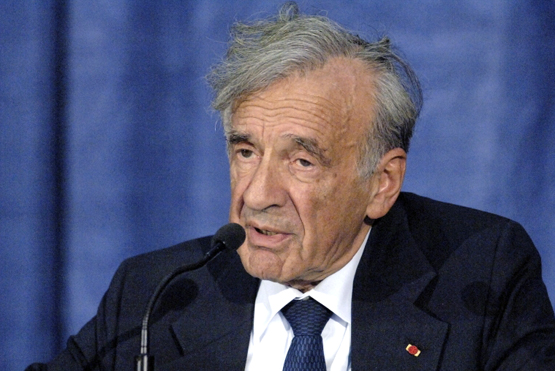FAYETTEVILLE, Ark. – Elie Wiesel, a champion of human rights whose memoir, Night, has taught generations what it meant to live through the Holocaust, will speak at 7 p.m. Wednesday, March 7, at the Walton Arts Center, as part of the University of Arkansas student-funded Distinguished Lecture Series. A 30-minute book signing will follow the lecture.
The event is free and open to the public. Doors open at 6 p.m. and free tickets will be given out at the door. Auditorium seating is limited to about 1,100 people, but overflow seating with video and audio will be available.
“This lecture has created a huge amount of interest,” said Kayln Williams, student co-chair of the Distinguished Lecture Series committee. “Students who have read Night are excited about having the chance to hear professor Wiesel in person. We’ve also heard from people all over the state who are interested in attending. Several high school teachers who assign Night in their classes have said they want to bring their students to this once-in-a-lifetime opportunity.”
To help accommodate University of Arkansas students, the committee is once again providing bus service to and from the Walton Arts Center. Two university transit buses will run a route between the Central Station next to the Arkansas Union and the Walton Arts Center from 5:30 to 7 p.m., and will be available to return students to campus after the lecture and book signing.
Elie Wiesel survived his time in the Nazi concentration camps at Auschwitz and Buchenwald, but his father, mother and one sister were killed. He has dedicated his life to preserving the memory of the Holocaust for future generations, while being a strong advocate for human rights around the world. He was among the first to speak out against the oppression of Jews in the Soviet Union, Nicaragua’s Miskito Indians, Argentina's “Disappeared,” Cambodia’s refugees, the Kurds, South African apartheid victims, famine victims in Africa, the prisoners in the former Yugoslavia and most recently the victims of genocide in Darfur.
Wiesel received the Nobel Peace Prize in 1986. Shortly afterward he established the Elie Wiesel Foundation for Humanity. He was a driving force in the creation of the U.S. Holocaust Memorial Museum in Washington, D.C., and was awarded the Congressional Gold Medal and the Presidential Medal of Freedom for his work.
Wiesel has written more than 50 books and has taught at Boston University, Yale University, and City University of New York.
The Distinguished Lecture Series at the University of Arkansas is a student-sponsored program. Speakers are chosen by a committee made up of students, faculty and staff, and the events are funded by a student-approved fee, appropriated by the Associated Student Government.
Past lecturers have included Benazir Bhutto, the Dalai Lama, Ehud Barak, Robert Redford, Martin Luther King III and former President George H.W. Bush.
Topics
Contacts
Kayln Williams, co-chair
Distinguished Lecture Series committee
405-996-6808,
Steve Voorhies, manager of media relations
University Relations
479-575-3583,
